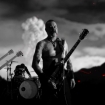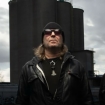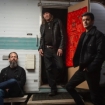It's not yet 2 o'clock on an overcast August afternoon in Oakland, California, but the scene at the Silver Lion bar is already pretty grim. A group of bored-looking middle-aged men play dominos while halfheartedly downing domestic beers. A woman in an electric wheelchair works her way through a series of shots lined up before her. A big-screen TV tuned to the Game Show Network fills a tiny corner of the dingy, low-ceilinged room with the zombie-like laughter of a live studio audience.
Despite the dismal surroundings, Matt Pike is in a fine mood. Last night the frontman of Oakland's High on Fire treated his girlfriend to dinner at a fancy restaurant a few neighborhoods over from the Silver Lion. "Then we went home and did a bunch of blow," he says with a satisfied look, taking a slug from an espresso martini. (The awful-looking concoction is Pike's drink of choice at this early hour. "It helps you get shit done," he explains.)
In fact, Pike has more to be cheery about than good food and plentiful drugs. This month High on Fire releases its fourth full-length, Death Is This Communion (Relapse), a typically robust collection of 11 immense-sounding barbarian-metal jams that Pike calls the best record he's ever made. Death is the follow-up to 2005's Blessed Black Wings, which in addition to earning favorable notices from such august institutions as the New York Times also expanded High on Fire's audience to its broadest dimensions yet.
The new album hardly sands down the remarkably rough edges of High on Fire's sound: Opener "Fury Whip" revs its engines on a complicated, meter-shifting groove for nearly two minutes before Pike unleashes his gravelly growl, while "Rumors of War" somehow manages to make a molasses-thick sludge-rock riff move at the speed of hardcore. Yet with the mainstream's increasing interest in metal—see the ascent last year of former underground heavyweights Mastodon to MTV rotation—Death Is This Communion could be the album that turns High on Fire from a cult favorite into an aboveground concern.
"I'm ready to perform on that next level," says Pike. "I just want one step up. I really envy the guys in Clutch, who can sell out big places, but it's still at this very personal level. That's a great place to be: You play to 1,000 people a night, you make a living from music, and you express yourself without worrying about girls chasing you down the street, stripping you down, and raping you."
"They definitely deserve a breakthrough," says Sunn O)))'s Greg Anderson, whose label, Southern Lord Records, recently released a CD containing the complete studio works of Pike's early band Asbestosdeath. "I've always thought that any band oozing with that much intensity could connect with people in that way. You look at bands that are really heavy and intense—like Motörhead—and High on Fire have many of those qualities."
Mainstream approbation has been a long time coming for Pike, who prior to forming High on Fire in 1998 with drummer Des Kensel and bassist George Rice, played guitar in the revered mid-Nineties stoner-metal outfit Sleep. But as a kid growing up in Denver, the young Pike didn't seem to have any sort of success in his future, as he spent most of his time "getting into a bunch of trouble for stealing cars and car stereos." The state of Colorado sent him to juvie, then his parents sent him to military school. "That was way more horrendous," Pike says with a laugh.
During his mid-teens, Pike moved to San Jose—a Silicon Valley suburb about 45 minutes southeast of Oakland—and there salvation (of a sort) arrived in the form of "a strange little kid" named Al Cisneros, whom Pike—"a strange little kid myself"—met in high school. "He already had this band together called Asbestosdeath," Pike remembers. "It was punk rock, but a different kind of punk rock—like Black Sabbath meets Amebix." Pike had learned to play guitar from his grandfather at age 8, and with him on board, Asbestosdeath played local gigs around the East Bay, including the occasional show with the Dwarves and the Melvins. "We even did gigs with Green Day and shit at Gilman Street," Pike says, referring to the legendary Berkeley punk venue. "Lots of the crusty kids liked us. Of course, we were little kids, so if we sold 50 seven-inches we thought we were hot shit."
Pike says singer-bassist Cisneros was the "creative genius" of Asbestosdeath, which also included guitarist Tom Choi and drummer Chris Hakius. "At some point Al and Tom butted heads," Pike explains, which led to Choi's departure and the eventual metamorphosis of Asbestosdeath into Sleep. "Al was always too smart for his own good, which I encouraged," says Pike. "But then I said, 'Here, take some acid, dude,' and he ended up Sabbath-ing the fuck out. I got Al on a path, and after that we all just went downhill together, smoking weed all day and taking any drugs we could find. It was totally cool."
Sleep quickly cultivated a reputation for playing as slow as humanly possible—the result, Pike says, of his and his bandmates' attempt to "find some sort of nirvana through music. It wasn't about being fancy and showing off," he says of the band's material. "It was more about feelings and religion and spirituality. We were all trying to find God." Sleep made three long-players, but the group is perhaps best known/most notorious for 1995's Dopesmoker, which consists of a single 65-minute song. London Records, the band's label at the time, refused to release it. "They tried to do radio edits," Pike says, still incredulous. "I was like, 'You're fucking insane! You can't do a radio edit of this—one of the riffs is as long as some of your other bands' entire songs.'" Determined to get what it considered its defining artistic statement out into the world, the band reentered the studio with producer Billy Anderson and whittled Dopesmoker down to a relatively lean 52 minutes, titling the new version Jerusalem. London didn't budge. (Jerusalem was finally released in 1998, while Dopesmoker made it into record stores in 2003.)
The frustration surrounding Sleep's Dopesmoker troubles began to tear the band apart. Prohibited from playing live thanks to legal battles with both London and Earache Records (which released the band's second full-length, Holy Mountain), the group "got to the point where we didn't know what to do," Pike says. "We finished what we could finish, so we finally just said, 'Dude, that's it.' The whole nine or 10 years I was with Sleep were amazing, but it got to a point where we had to be so calculated about what we were doing that we ended up just second-guessing ourselves all the time."
In the years following the band's demise—as word began to spread about Dopesmoker's epic drone-metal excellence—Sleep accrued a whiff of legend it couldn't have actually laid claim to within its lifetime. Greg Anderson compares the posthumous acclaim with the buzz Kyuss earned once Queens of the Stone Age blew up. "I went to Sleep shows in the Nineties," he says. "There weren't many people there."
"When I saw what happened after we broke up I was like, Jesus, we're idiots!" Pike laughs. "I'd be a fucking millionaire right now if we hadn't broken up." Pike says the immediate post-Sleep phase of his life was a dark one; in addition to the band's breakup, he also learned that his mom was dying of cancer and "got hit with a whole rash of other shit. I lost it pretty good during that time." Eager to "get the fuck out of San Jose," Pike decided to move to Oakland in 1997. "I came here all the time with Sleep," he explains. "We'd play a show and then party all weekend, so I already knew everybody in town."
Within six months of his arrival in Oakland, Pike began seeking out musicians to jam with. One of the first was drummer Des Kensel, a friend of a friend who himself had recently relocated to the Bay Area with just his clothes and drums jammed into his car. "I picked up Matt at his house and he had to sit in the backseat because my kick drum was in the front," Kensel recalls. "I remember he walked to the door and I saw this silhouette of a guy with big hessian hair and a flannel shirt. It was fucking hilarious. I was like, Oh man, this is gonna be great."
Pike says that his musical relationship with Kensel clicked instantly. "He was the first drummer I tried, and as soon he started playing, I was like, That's the man. No one even tempted me to go another route. I can't say I haven't driven him nuts. Des is a wild man, too, but he's got a head on his shoulders. I can be a little fucking weird to be a partner with: I'm very neurotic, and I do some dumb shit. But he's done an awesome job putting up with me. He's bad as fuck."
George Rice auditioned with Pike and Kensel to be the new band's singer but ended up becoming its bassist instead. That made Pike the trio's de facto frontman. "I thought, OK, I'll do it," he says. "Singing and playing at the same time is fucking hard. I really respect James Hetfield for being able to sing and play on 'Battery.'" Has Pike ever considered finding a singer since the band's inception? "Nah, not after I started. It wouldn't be the same. Al had the responsibility of the lyrics in Sleep, but I like that responsibility. I like jumping into that role; it gives me more to think about. Sometimes I get bored just playing guitar."
Lineup complete, the new band dubbed itself High on Fire. Musically, Pike says, "we wanted to keep some of it doomy and Sleep-ish. But we also wanted to go in a different direction. I wanted it a little faster. I was sick of playing fucking slow." During the Sleep days in San Jose, Pike had studied jazz improvisation and music theory at community college, and now he was anxious to put his knowledge to work. "I was looking for more variety in High on Fire," he says. "I wanted to become a stronger musician by forcing myself to do it."
For its debut, 2000's The Art of Self-Defense, the band signed to Man's Ruin, a now-defunct Bay Area indie that also issued records by Queens of the Stone Age and Fu Manchu. "That was great," Pike says, "because I could drive over to [label founder and acclaimed poster artist] Frank [Kozik]'s office and say, 'Hey, I need five grand for recording.'" After Self-Defense ignited an underground frenzy, the band was snatched up by Relapse, which released 2002's Surrounded by Thieves. From the outset, Pike has been shocked at the positive reception granted High on Fire's records.
"We're definitely a musician's band," he says. "Musically, it's totally its own thing. You can compare it to stuff, but it's not exactly like what you'd expect. I mean, I'm a bizarre guitar player, and everyone who plays with me is phenomenal in their own bizarre-ass ways. We don't play like everybody else."
"Matt is a master of his craft," says Anderson. "He's an incredible songwriter who comes up with amazing riffs. And he's really come into his own with High on Fire. Asbestosdeath and Sleep were more about his influences; it was kind of a clever way of twisting Neurosis and Black Sabbath into something cool. But now he's doing way more than rehashing the same pile of Sabbath riffs."
Exhausted by the band's heavy touring schedule, Rice left High on Fire following Surrounded by Thieves. Thanks to a tip from Anderson, Pike asked former Melvins man/Thrones mastermind Joe Preston if he'd be interested in playing bass on Blessed Black Wings, which the band was preparing to record with producer Steve Albini. "Joe is such a neat guy," Pike says. "He's sober, but he's got a really good head for music. His Thrones records are off the fucking charts. I was honored that he wanted to play with us." After the album was completed, Pike invited Preston to tour with the band, which Preston did for a year and a half. "After that," Pike laughs, "he was like, 'OK, guys, you're fucking crazy. I'm done.' We kind of expected it."
With touring for Blessed Black Wings wrapped up, Pike took a short break from High on Fire to join Kalas, an East Bay metal outfit in which he served as lead vocalist—and that's it. "That was my singing practice," Pike says now. "But then the band actually started getting good." Kalas made a self-titled debut and did some limited touring, but Pike couldn't commit to more than that. "We talked about playing more shows," Pike says, "but between that and touring with High on Fire, that's basically asking me not to have a life. I can't stay away from Oakland for that long. So we did our thing and then went our separate ways. It's a good record, and I'm glad we made it."
Before they could begin work on Death Is This Communion, High on Fire needed a bass player. So Pike called up Hank Williams III—whom he'd met while High on Fire were on tour with Williams' then-band Superjoint Ritual—and asked him if he might want to lay down some low end in the studio. "He's all, 'Well, I ain't got the time,'" Pike recalls in his best hillbilly accent. "But he asked if I knew Jeff Matz from Zeke, which I did. We'd toured with Zeke, and Jeff is fucking bad. So he came down from Seattle in a little car with eight different amps in it, and I found him an apartment next door to mine. He moved in and started hooking up with my friend Dominique. Now they're lovebirds."
Pike and Matz began writing songs together while Kensel recovered from back surgery. "When Des came back, we had this big riff tape," Pike says. The trio then hammered out the skeletons of the new songs, with Pike adding the details later. To record the new album, the band headed up to Seattle for three weeks this spring to work with Jack Endino, the grunge pioneer who produced many of the Seattle scene's landmark recordings, including Mudhoney's Superfuzz Bigmuff and Nirvana's Bleach. "You have no idea how fucking awesome Endino is," Pike gushes. "He wouldn't let me do anything half-ass. I'd rip a solo and he'd be like, 'Eh, didn't really do anything for me.' So then I'd be like, 'All right, fucking erase it and let's do it again.' Afterwards, of course, I told him, 'I'm glad you were a dick.'"
"Matt had ideas about sound which turned out to be pretty similar to my own," says Endino. "We're both total guitar geeks, so we spent a lot of time experimenting with different tones and amps and guitars. The goal I set for myself every time is to help someone make the best record they've ever made, and when we were done with this one, I felt like, 'Mission accomplished.'"
Kensel is hopeful that all the hard work will pay off. "I definitely think we'll gain more fans with this record," the drummer says. "We're not at the same level, but I kind of consider ourselves to be a band like Motörhead, where we can appeal to a pretty wide audience: filthy old rockers, skater kids, younger punk rockers, metal dudes—basically just the whole genre of hard rock."
Downing his last espresso martini of the "morning," Pike is a bit more blunt. "If the last one didn't tear your fucking head off, then this one will," he promises of his band's new album. "We're just gonna murder everybody's ass and hand it to 'em. I mean, if you don't get this, then I don't know what to tell you—you're obviously a fucking idiot."








